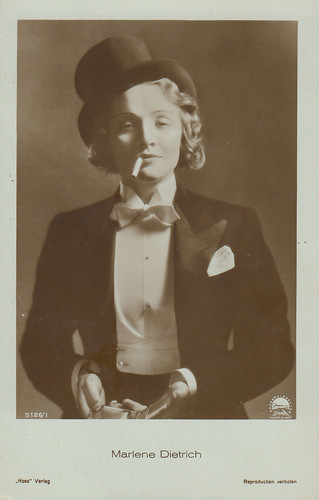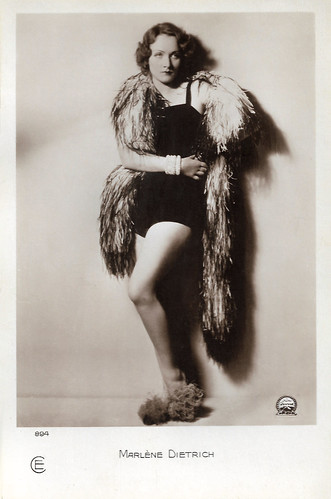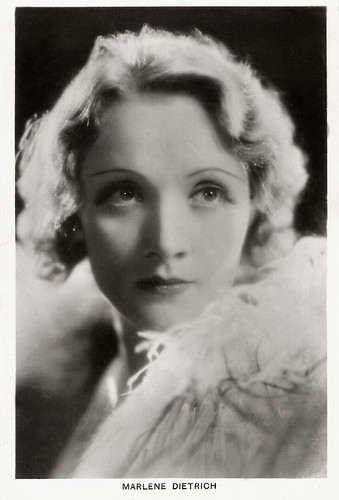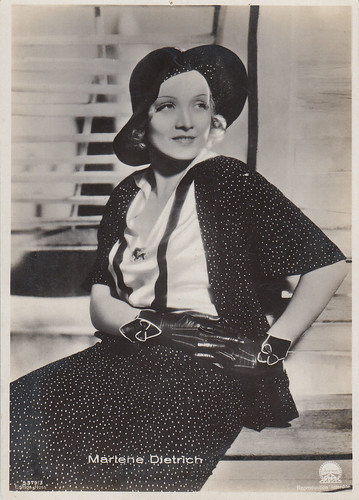
German postcard by Ross Verlag, no. 5380/1, 1930-1931 Photo: Paramount. Gary Cooper and Marlene Dietrich in Morocco (Josef von Sternberg, 1930).

German postcard by Ross Verlag, no. 5126/1, 1930-1931. Photo: Eugene Robert Richee / Paramount. Marlene Dietrich in Morocco (Josef von Sternberg, 1930). Collection: Marlene Pilaete.

Small German card by Ross Verlag for Hänsom Cigaretten by Jasmatzi Cigaretten-Fabrik G.m.b.H., Dresden, Tonfilmseries, no. 358. Photo: Paramount. Marlene Dietrich in Morocco (Josef von Sternberg, 1930).

German postcard by Ross Verlag, no. 5751/1, 1930-1931. Photo: Paramount. Gary Cooper in Morocco (Josef von Sternberg, 1930). Caption: Garry Cooper (sic).

German postcard by Ross Verlag, no. 5582/5, 1930-1931 Photo: Paramount. Marlene Dietrich in Morocco (Josef von Sternberg, 1930).

German postcard by Ross Verlag in the Luxus series, no. 501. Photo: Paramount. Marlene Dietrich in Morocco (Josef von Sternberg, 1930).
The beautiful nightclub singer, the rich gentleman, and the womanising legionnaire
Beautiful young nightclub singer Amy Jolly (Marlene Dietrich) arrives in Morocco during the last period of the so-called Pacification of Morocco by the French Army. The rich gentleman La Bessière (Adolphe Menjou) already has his eye on her on the crossing and offers his help, which she refuses.
She manages to get herself an engagement in Lo Tinto's, a Mogador cabaret, and is stormily celebrated by the audience. During her inimitably seductive, tuxedo-clad act, Amy meets the simple but handsome foreign legionnaire Tom Brown (Gary Cooper), who is considered a womaniser, and he notices her. Amy falls in love with Tom. Both bruised by their past lives, the two edge cautiously into a no-strings relationship.
When the adjutant Caesar identifies him as his wife's lover, Tom is interrogated under flimsy circumstances, but Amy is able to defuse the situation for the time being with the help of La Bessière. Tom promises to desert the Foreign Legion for her and go away with her, but leaves her and goes to the front - although he fears that his superior Caesar will take revenge on him. Caesar actually tries to dispose of Tom at the front in an inconspicuous way but falls victim to the rebels' hail of bullets himself.
Amy, disappointed in Tom, accepts La Bessière's marriage proposal after a few weeks. On the evening of the engagement party, the troupe returns without Tom and Amy has to assume that he is injured. During the engagement dinner, Amy leaves the table in a hurry and runs to Brown, with La Bessière accompanying her out of love. He complies and takes her away in his car to frantically search for Tom at the distant troop location.
Amy eventually finds him not in the hospital but in the bistro with another woman: the valiant legionnaire has not been wounded, he has only pretended to be so as not to return to Mogador. He thinks that only a man like La Bessiere can give her the luxurious life she wants. Tom tries to convince Amy that he does not love her, but she finds out that this is not true. The next day he has to go back somewhere in the Sahara. Amy Jolly, who has seen that native women follow the unit where their man is serving on these marches, leaves La Bessière, follows Tom into the Sahara. First, on high heels shoes, then taking her shoes off, and going on naked feet, along with a handful of native women, donkeys, and she-goats.

French postcard by A.N., Paris, no. 627. Photo: Paramount. Marlene Dietrich in Morocco (Josef von Sternberg, 1930).

French postcard by Erres, no. 8. Photo: Paramount. Marlene Dietrich in Morocco (Josef von Sternberg, 1930).

German collectors card by Ross Verlag in the series 'Vom Werden deutscher Filmkunst - Der Tonfilm', album no. 11, picture no. 149. Photo: Paramount / Ross Verlag. Gary Cooper and Marlene Dietrich in Morocco (Herzen in Flammen) (Josef von Sternberg, 1930).

French postcard by Cinémagazine-Selection, no. 894. Photo: Paramount. Marlene Dietrich in Morocco (Josef von Sternberg, 1930).

French postcard, no. 46. Photo: Paramount. Marlene Dietrich in Morocco (Josef von Sternberg, 1930).

German postcard by Ross Verlag, no. 5381/1, 1930-1931 Photo: Paramount. Gary Cooper and Marlene Dietrich in Morocco (Josef von Sternberg, 1930). Collection: Marlene Pilaete. Please have a close look at this Ross postcard and then compare it with the French postcard above.
One of the first public lesbian kisses shown in cinema
After Der blaue Engel/The Blue Angel (1930), director Josef von Sternberg once again worked with Marlene Dietrich. It was her debut for American audiences. Although Der blaue Engel (1930) had been filmed first and released in Europe, its release in the United States was delayed until Morocco (1930) had played in theatres.
During filming, Gary Cooper was 29 years old and Marlene Dietrich was 28. Marlene Dietrich immediately received an Oscar nomination for Best Actress in a Leading Role for her first English-language film. It was Dietrich's and Josef von Sternberg's second out of seven feature-film collaborations.
Dietrich spoke little English at the time and learned her lines phonetically. According to the actress herself, her first scene, with the line "I won't need any help", was shot 48 or 49 times. Marlene sings three songs in this film, including one in French, 'Quand l'amour meurt' by Georges Millandy.
The kiss on the mouth that Marlene gives to a female spectator at Lo Tinto's, while dressed as a man, is one of the first public lesbian kisses shown in cinema. It was added to the script at Dietrich's suggestion. She herself saved the scene from being cut by the censors when she came up with the idea of taking a flower from the woman before kissing her and then giving the flower to Gary Cooper, explaining that if the censors cut the kiss the appearance of the flower would make no sense. The censors were satisfied with this reasoning.
The screenplay by Jules Furthman was based on the novel 'Amy Jolly, die Frau aus Marrakesch' (Amy Jolly, the Woman from Marrakesh) by Benno Vigny, first published in 1927. The Paramount film premiered on 14 November 1930 at the Rivoli Theatre, New York.
Lucia Bozzola at AllMovie: "Dietrich's Amy Jolly is a sensuous figure of desire and mystery amid von Sternberg's signature mise-en-scene of lushly exotic surroundings, layered shadows, and gauzy fabrics. Her first nightclub performance exudes an androgynous eroticism that would define her star persona: although she eventually sacrifices everything to follow Cooper's Tom Brown across the visually arresting desert sands, the tuxedo-clad Amy accepts a flower from a female admirer and nonchalantly kisses her on the lips before tossing the flower to an equally smitten (and beautified) Cooper. Along with the stunning imagery, von Sternberg inventively used sound to enhance the atmosphere, particularly when Amy makes her final decision between a rich man and the Legionnaire she loves."

British postcard in the Picturegoer Series, no. 520a. Photo: Eugene Robert Richee / Paramount. Marlene Dietrich in Morocco (Josef von Sternberg, 1930). Collection: Marlene Pilaete.

Vintage postcard. Photo: Paramount. Marlene Dietrich in Morocco (Josef von Sternberg, 1930).

British postcard in the Picturegoer Series, London, no. 517. Photo: Paramount. Gary Cooper and Marlene Dietrich in Morocco (Josef von Sternberg, 1930).

British postcard in the Picturegoer Series, London, no. 518. Photo: Paramount. Gary Cooper and Marlene Dietrich in Morocco (Josef von Sternberg, 1930).

Italian postcard by Cinema-Illustrazione, series 2, no. 31. Photo: Paramount. Marlene Dietrich and Gary Cooper in Morocco (Josef von Sternberg, 1930).

Belgian postcard. Photo: Paramount. Marlene Dietrich and Gary Cooper in Morocco (Josef von Sternberg, 1930).

German postcard by Ross Verlag, no. 5379/3, 1930-1931. Photo: Paramount. Marlene Dietrich in Morocco (Josef von Sternberg, 1930). Collection: Marlene Pilaete.
Sources: Lucia Bozzola (AllMovie), Wikipedia (French and German), and IMDb.
No comments:
Post a Comment